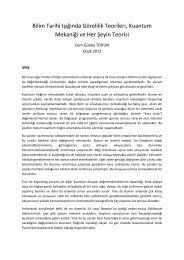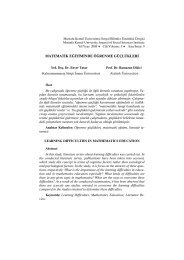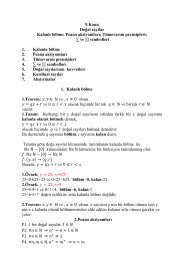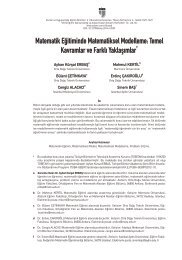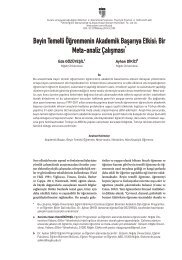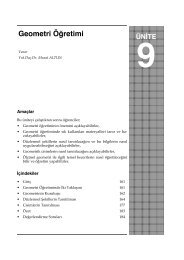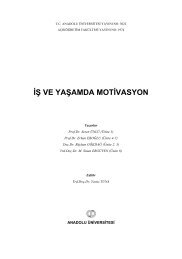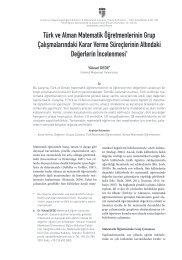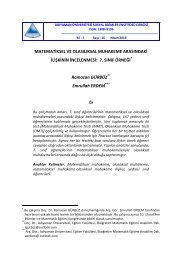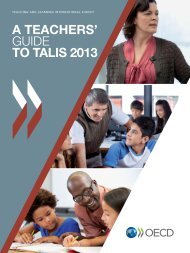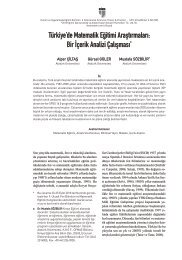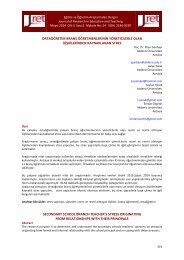NEWSLETTER
2015-12-98
2015-12-98
Create successful ePaper yourself
Turn your PDF publications into a flip-book with our unique Google optimized e-Paper software.
Interview<br />
Do you understand everything you are doing in mathematics?<br />
I mean, what is important about a theorem<br />
is not its precise formulation but the idea of the proof<br />
which can be used to prove many different theorems.<br />
If you just use the exact formulation, you are actually<br />
treating the theorem as a black box.<br />
I used to understand all the mathematics that I do, from<br />
the very basics all the way up. There were no black boxes.<br />
But in some recent collaborations just in the last year, I<br />
have used some theorems I did not understand from first<br />
principles but took on trust, using them as black boxes<br />
as you say. I must admit that at first it made me quite uncomfortable.<br />
It did not seem to bother my collaborators<br />
as much though, who were already used to it after many<br />
years of it! This is a modern phenomenon in doing mathematics,<br />
building on years and years – and pages and<br />
pages – of our predecessors’ work, to the point where it<br />
is not possible for any one person to know every detail.<br />
But one must get used to it. In some sense, it is also aweedge<br />
of the pyramid. This is impressive. When did you<br />
encounter, say, complex analysis?<br />
I always enjoyed doing such things on my own for fun.<br />
But, as I said, I never skipped any grades. For example, I<br />
did not learn complex analysis until I was a sophomore in<br />
college and took a course. So I was never that much more<br />
advanced than my peers, particularly when I reached college<br />
at Harvard, where so many students were really advanced.<br />
Did you ever read a math book cover to cover?<br />
Yes, I often did in graduate school. Princeton did not offer<br />
many courses for beginning graduate students so this<br />
was the way I learned much mathematics.<br />
You always were a good boy?<br />
I guess so. I’m told I was quite hyper and naughty when<br />
I was a 3- or 4- or 5-year-old but it seems I outgrew that!<br />
Did you have other interests? Reading? The classical<br />
Indian epics such as Ramayana and Mahabharata constitute<br />
a treasure trove which must be very fascinating<br />
to a child.<br />
Yes, these epics, as well as various other works of literature,<br />
were frequently the topics of conversation over<br />
family dinners at home. In fact, my uncle often made<br />
these conversations into contests, as to who knew the<br />
most details about various aspects of these works. These<br />
contests were a lot of fun and added – for my cousins and<br />
me – a further motivation to read!<br />
Later on, did you consider any alternative careers?<br />
I did often toy with the idea of becoming a musician and<br />
tabla player as a profession. But at some point, I realized<br />
that if I became a mathematician, I’d still find time to<br />
keep up music as well but if I became a full-time musician,<br />
I’d probably have a tough time keeping up mathematics!<br />
So you were all set to be a mathematician from an early<br />
age?<br />
I always loved math and because my mother was a mathematician,<br />
I was always aware of that pleasant career option.<br />
But I did have brief periods when I changed and<br />
thought maybe I’d like to do computer science, or economics,<br />
or physics, or linguistics, as I liked these subjects a<br />
lot too. But I always realized that mathematics was what<br />
was bringing these subjects together, and mathematics<br />
was what I liked about them.<br />
How do you do mathematics?<br />
I usually like thinking about mathematics while walking,<br />
or jogging, or pacing, or working with someone at the<br />
blackboard. I quite rarely sit down with a pen and paper<br />
and do mathematics; that usually comes after something<br />
has been worked out already.<br />
So you cannot think when you are standing still.<br />
I guess that’s a good way of putting it! The reason I stay<br />
away from paper is that often when I think about math-<br />
ematics, it is not in words or in terms of things that can<br />
be written down yet. That usually comes later when I try<br />
to translate these thoughts into more usual mathematical<br />
language.<br />
What about collaboration?<br />
I love working with others. Thinking and talking about<br />
and working on mathematics together with others is one<br />
of the joys of mathematics. It can also be more productive.<br />
Collaboration forces you to think things through<br />
by explaining them, and the other person can then give<br />
invaluable input, feedback and new perspectives, as<br />
you bounce ideas off one another. Sometimes, different<br />
collaborators can bring different areas of expertise to<br />
a problem, which can be very valuable and help bring<br />
some cross-pollination between areas.<br />
Does working with someone not interfere with your<br />
thinking process? When you are thinking hard about<br />
something, you do not want to be interfered with.<br />
Sometimes. But, in collaboration, one generally decides<br />
which parts are more productive or fun when discussed<br />
together and which parts each should go home and think<br />
about alone. In the latter case, collaborators can go home,<br />
think separately and then bring their ideas the next time.<br />
So, even in collaboration, there is usually a lot of individual<br />
thinking. Actually, sometimes you’ll be working<br />
with a collaborator where no one speaks for over an hour<br />
– individual thinking is going on! But still it’s fun to do<br />
it together, knowing that there is someone there in case<br />
you are ready to share an idea, or problem, or general<br />
confusion.<br />
Nothing beats direct human conversation, or should<br />
I say interaction. Are there problems you have solved<br />
in collaboration that you would not have been able to<br />
solve by yourself?<br />
Almost certainly! This is, of course, impossible to know<br />
for sure. But I definitely think so, and I suspect this is<br />
likely the case in most of my collaborations!<br />
40 EMS Newsletter December 2015





